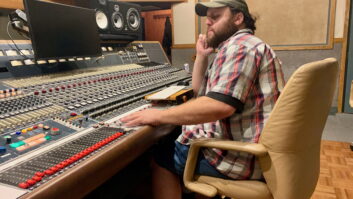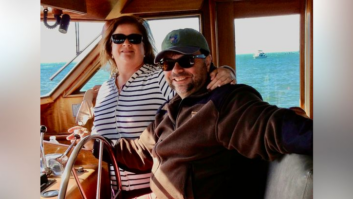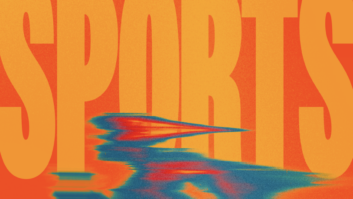‘Open Source’ Station KYCY Finds Lots of Content, If Not Yet Many Listeners
It’s been more than a half-year since Infinity Broadcasting converted San Francisco’s KYCY(AM) to KYOURADIO, dumping its syndicated news talk format in favor of listener-submitted podcasts.
Since then, Bay Area listeners and surfers who log onto www.kyouradio.com have been hearing an eclectic range of programming, all of it produced for free by podcast enthusiasts.
Not all of the shows have been by unknowns; for instance, the music history podcast “Rock 50 With Mike Stark” is co-hosted by Black Sabbath drummer Bill Ward, described by www.playlistmag.com as being “a good deal more articulate than Ozzy.”
“When KYOU took to the airwaves, I initially had to take what I could get,” said KYOU/KYOURadio.com Station Manager Stephen Page. “But now I’ve gotten to the point where I can pick and choose, sometimes by asking people who have submitted good shows in the past to do more, sometimes by stumbling across creative podcasts and asking their producers if they want to get involved.”
And then there are those shows that podcasters submit directly to the station site; at last count, Page estimated that he had “over 9,000 people signed up to listen to the online stream and about 2,000 offering to produce content.”
Filtered
Part of the logic behind an all-podcasting station is to minimize staff costs, and Infinity has certainly accomplished this at “KYOU.” Besides Page and an assistant who integrate the podcasts into a coherent broadcast day – supplemented by some paid infomercials on the AM to help pay the bills -KYOURADIO’s staff consists of “seven board operators who make sure everything gets played when it should be played,” Page said.
KYOURADIO also has a staff of lawyers and screeners who audition the podcasts for legalities and content.
The process starts with the lawyers in Washington: “They listen for libelous/defamatory content, and items that could cause problems with the FCC,” Page said. Once the podcasts get legal approval from Infinity, they are shared among three “screeners” who work out of their homes – two in San Francisco and one in New York.
“The screeners act as another set of ears and review the shows for me, to tell me what they think works and what doesn’t.”
Should a podcast pass these two hurdles, Page has the option of scheduling it.
Music rules
When Page came to KYOURADIO after 20 years in radio and seven in online music, his goal was to strike a 50/50 balance between music and spoken word programming. However, the balance soon tilted heavily in music’s favor. Today, he estimates that only 20 percent of KYOURADIO’s podcasts are spoken word.
“It is much easier for someone to sit by a microphone and say a few words punctuated by their favorite songs, than it is for them to simply talk into the mic and say anything that is of real interest to anyone else,” Page said. “This is why we are doing so much music programming; which we pay full rights for, by the way.”
To say the least, the music lineup is varied. On the day this article was written, for instance, it included world beat, rock, Celtic, Japanese hip-hop, jazz and Latin, to name a few.
This said, KYOURADIO/KYOURadio.com does have some interesting talk shows, at least judging by their program notes.
For instance, Dan Klass’ “Bitterest Pill” podcast features “The tale of a man, his trusty broom and a vicious marsupial,” while Rowland Cutler’s “DarkCompass” features a Londoner “who records commentaries as he heads to and from work,” Page said. “It seems to ramble at first, but after a while it gets hypnotic. You feel like you’re sitting next to him in the Tube.”
Results
When it comes to podcast content, Page has an unlimited supply available to him. But what are his resources like when it comes to actual listeners? That’s something else.
Based on hits at www.kyouradio.com , “We’ve got anywhere from 300 to 400 people listening at a time,” he says. As for on-air audience? The station did not make an impact in the recent summer Arbitron ratings. Before the book, Page said he wouldn’t be surprised if KYOU didn’t show up, noting that KYCY hadn’t appeared in its last three ratings sweeps. Subsequently, he said the summer book was “too early to detect any changes in listening habits.”
Page said Infinity relied on word of mouth and occasional media coverage for promotion of the station – due not to tight budgets but a fear of alienating the podcast community by promoting KYOURADIO aggressively. However, he said, “I am starting to get e-mails from people who tuned across the AM band in San Francisco, become intrigued with a particular podcast and then stuck with us.”
Fortunately for KYOU, the money brought in by its remaining infomercials is enough to keep the station marginally profitable. This means Infinity has time to figure out how “monetize podcast content” over the long term, said Page.
Also, as a result of this station’s podcasting experience, he said, KYOURADIO “has become an R&D laboratory for Infinity stations in general. For instance, the podcasts that are now running on Infinity’s talk stations are a direct result of lessons learned at KYOURadio.com. Now we’re doing the same kind of groundbreaking work for other Infinity stations. It has got to the point that, when an Infinity programmer has a question about podcasting, they give us a call.”
Page is optimistic about the operation’s chances, given the continually expanding popularity of podcasting.
“When Apple started linking podcasts on their iTunes web site, it really pushed the medium up a notch,” he said. “Now that Yahoo is offering a directory of podcasts, it’s leaped up a level again.”







